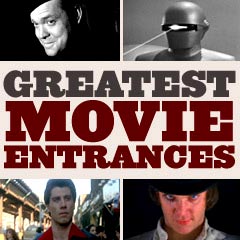
|
Entrances of All-Time 1966-1969 |
![]()
| Movie Title/Year and Film Character with Scene Description | ||||||||||||
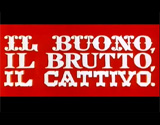 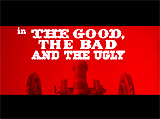
|
The Good, the Bad, and the Ugly (1966, It.) (aka Il Buono, Il Brutto, Il Cattivo)
Sergio Leone's spaghetti western was the third and final segment of the Dollars (or "The Man With No Name") Trilogy, after A Fistful of Dollars (1964, It.) and For a Few Dollars More (1965, It.). This great western was set during the Civil War in the mid-1860s. The film's opening sequence included a 25 minute introduction to its three main characters: Tuco "the Ugly" (Eli Wallach), Sentenza/"Angel Eyes" or "the Bad" (Lee Van Cleef), and Joe/"Blondie" or "the Good" (Clint Eastwood). As with Leone's other westerns, this film was viciously violent and machismo in tone, but buoyed by the classic, instantly-recognizable, twanging Ennio Morricone score, very little dialogue, lots of closeups, and vast widescreen landscapes. The film's plot, set during the Civil War, concerned the acquisition of a "cash box" of $200,000 in stolen Confederate gold coins buried in a grave at a faraway cemetery location. The stylized Western, considered a pre-quel to the two other films in the trilogy, opened with a classic shoot-out scene involving three bounty hunters, who converged on a desolate ghost-town. They went into one of the buildings, guns blazing. Their target, Tuco Benedicto Pacifico Juan Maria Ramirez, known as "The Ugly" (Eli Wallach), shot two of the men dead (and seriously wounded the third), burst through the front window, and escaped on horseback.
The next scene took place a few miles away, where a brutal and sadistic gunman known as "Angel Eyes" rode up - and was seen in close-up; he entered a family's hacienda, sat down and wordlessly helped himself to a prepared meal; he had been hired for $500 dollars by his employer Baker (Livio Lorenzon) to question ex-Confederate soldier Stevens (Antonio Casas) - to learn the new name of a fugitive soldier known as Jackson (who had changed his name).
Stevens reluctantly offered up Jackson's new name 'Bill Carson', and a bribe of $1,000 for Angel Eyes to kill another ex-soldier who was also involved in the gold coin theft named Baker (Livio Lorenzon), the one who had hired Angel Eyes; when Stevens drew his weapon, the gunman mercillessly killed both Stevens and his eldest son (Antoñito Ruiz); afterwards, the killer visited with the bed-ridden Baker and received $500 for getting the name and for killing Stevens - and then to fulfill Stevens' bribe, he cold-bloodedly murdered Baker by shooting him through his pillow with four gunshots after telling him: "When I'm paid, I always follow my job through." In a third introductory segment, Tuco was captured by another group of three bounty hunters, but then he was rescued by a Stranger ("Blondie"), who came upon the group, with his back to the camera. With a quick draw, he blasted the three bandits; he had a distinctive look - tan trenchcoat, flat-brimmed hat, dark shirt; the fast-draw gunman then turned in Tuco for a $2,000 bounty reward, as the bandit complained while tied up and draped over a horse saddle: "You'll pay for this! I hope you end up in a graveyard with the cholera, and the rabies, and the plague! Cut me loose! Cut me loose, you filthy bastard!" "Blondie" collected the $2,000 bounty reward from a local sheriff; the condemned bandit Tuco (known for his alias "the Rat") was sentenced to execution by hanging (from a hanging tree in the middle of town), for multiple crimes: murder, armed robbery, theft, arson in a state prison, perjury, bigamy, deserting his wife and children, inciting prostitution, kidnapping, extortion, receiving stolen goods, selling stolen goods, and passing counterfeit money. As Tuco was about to be executed, from a vantage point close by, "Blondie" shot the noose-rope around his neck and freed Tuco; shortly later at a rendezvous point, they met - and it was revealed that the two were involved in a money-making scam.
After their successful ploy when they were splitting up the reward money evenly ($1,000 to each), Tuco demanded more money:
"Blondie" disagreed with him: "If we cut down my percentage... it likely may interfere with my aim." In the next scene, Tuco was again about to be hanged to death for multiple crimes (murder, assault, rape, and derailing a train during a robbery) - now with a $3,000 bounty reward received after his capture; "Angel Eyes" watched as the scam was repeated, and knew that Tuco would escape with a "protective angel" looking out for him ("A golden-haired angel watches over him"); the rescue was repeated a second time ("Blondie" shot the hanging noose around Tuco's neck), and they escaped together. This second time, however, "Blondie" wanted out of their partnership: ("Our partnership is untied...You remain tied. I'll keep the money, and you can have the rope"); Tuco swore at him:
Tuco was left stranded in the desert 70 miles from town without a horse and water; as "Blondie" rode off, he bemoaned Tuco's bad attitude:
|
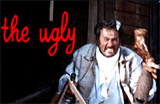 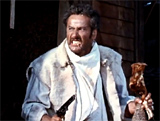 The Escape of Tuco "The Ugly" (Eli Wallach) 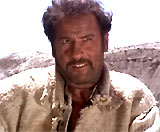 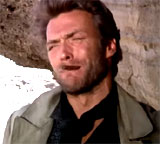 Tuco Demanding from Blondie More Than Half the Reward Money the Next Time, Although Blondie Disagreed 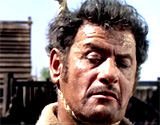 The Second Rescue of Tuco From Hanging by "Blondie" 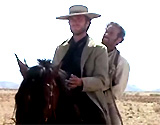 Riding Away Together After the Second Rescue 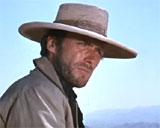 After Second Rescue - Blondie Broke Ties and Stranded Tuco: "Such ingratitude..." |
||||||||||
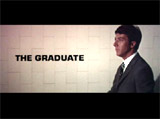
|
Young and alienated recent college grad Benjamin Braddock (Dustin Hoffman) stared into his fish tank's glass in his upstairs bedroom - away from celebratory party-goers for his own graduation party, composed of his parents' friends who were lauding him for his college achievements as "an award-winning scholar." He had retreated there, embarrassed when his activities were being publically recounted from his yearbook: "Captain of the cross country team, Head of the debating club, Associate editor of the college newspaper in his junior year, Managing editor in his senior year..." A black-clad Mrs. Robinson (Anne Bancroft), the wife of his father's business partner, was first seen in the living room, eyeing him from afar. In the next instance, she burst into his bedroom door in the same frame. They both appeared behind the pane of aquarium glass - she had followed him there, explaining that she was looking for the bathroom ("Oh, I guess this isn't the bathroom, is it?"), but her interest in him belied her excuse. He rose and told her twice: "It's, uh, down the hall...the bathroom's down at the end of the hall," but she entered the room uninvited anyway, and asked how he was doing. After intruding, she basically proceeded to ignore him, sat down, and requested an ashtray, and then made a snide comment about why he wouldn't have an ashtray: "Oh, yes, I forgot. The track star doesn't smoke." Looking upset, she asked if it was "a girl" that was his main problem - but Ben admitted that he was "disturbed about things" in general and would rather be alone. She briefly left the room, but then returned, and insisted that he drive her home because her husband had already left with their car. She refused to drive herself with his keys, because she admitted that she couldn't drive the foreign manual shift in his Alfa Romeo sports car, his main graduation present. Although he agreed to take her ("Let's go!"), she tossed his keys into the fish tank where he fished them out before they left together. This was the start of her memorable seduction of him. |
 First View of Mrs. Robinson 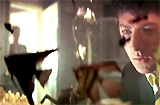 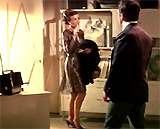 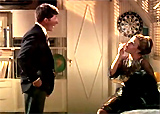
|
||||||||||
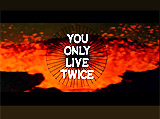
|
In two previous James Bond films, the master-mind head of SPECTRE (SPecial Executive for Counter-intelligence, Terrorism, Revenge, Extortion), a world-wide terrorist organization, was always portrayed with menace, but with face unseen while petting his white Persian cat in his lap. The character was previously played by uncredited Anthony Dawson in From Russia With Love (1963) and Thunderball (1965), but now was portrayed by British character actor Donald Pleasence. Once he had captured James Bond, a British 007 agent who was attempting to impersonate a SPECTRE astronaut about to launch from a rocket site hidden in a hollowed-out volcano on a remote island in Japan, Blofeld peered from behind one of his men and introduced himself:
He revealed himself as a bald, scar-faced (through his right eye), Mao tunic-wearing megalomaniac. Bond mentioned how he had lived through a fake assassination attempt in Hong Kong: "This is my second life." Blofeld threatened: "You only live twice, Mr. Bond." |
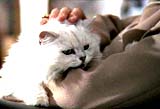 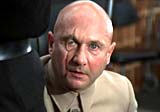
|
||||||||||
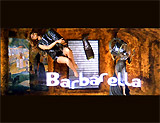
|
Barbarella (1968)
In the opening credits sequence of this erotic science-fiction fantasy, an inflight and weightless, 41st century Barbarella (Jane Fonda), wearing a protective dark spacesuit, began a slow-motion striptease while floating in mid-air, in zero gravity. She first removed her gloves (to reveal beautifully-manicured fingers and hands) and then her leggings. Her face appeared after a tinted shield over her helmet slowly lowered; when her helmet was removed and she shook her full head of hair, white letters were let loose to spell her name
Further letters for the credits were released as more coverings were freed from her body; by the end of the credits when the screen read: "DIRECTED BY ROGER VADIM," she was completely naked with the letters often strategically dancing around or coalescing to try and mask her private parts. |
 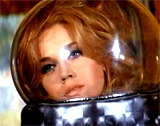 Barbarella (Jane Fonda) In Her Spacesuit 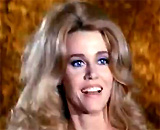 Barbarella After Her Strip-Tease |
||||||||||

|
Barbarella (1968)
Once Barbarella (Jane Fonda) landed in the City of Night (aka SoGo), she was observed warily before two rough-looking thugs threatened to rape her, and the winged angel Pygar (John Phillip Law) who had flown her there was taken away and abducted. Barbarella was saved when her two attackers were stabbed in the back by a figure behind them with a twirling knife in each hand. During a memorable entrance, Barbarella briefly met her rescuer - her tyrannical dominatrix and shadow/rival - the eye-patched, one-eyed evil Great Tyrant (of SoGo) (Anita Pallenberg, with voice by Joan Greenwood or possibly Fenella Fielding); the diabolical villainess was delighted by Barbarella and called her "Pretty-Pretty" as a way to proposition her:
|
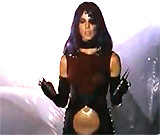 The Eye-Patched Evil Black Queen (The Great Tyrant) With a Twirling Knife In Each Hand 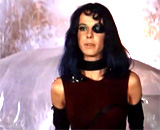 Barbarella Confronted by Her Diabolical Rival - a Lesbian Dominatrix - Calling Her "Pretty-Pretty" |
||||||||||
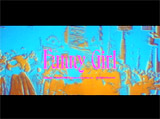
|
Funny Girl (1968)
Director William Wyler's musical romantic comedy-biopic was a loose retelling of the life story of Broadway and film star and comedienne Fanny Brice (Barbra Streisand in her film debut, in a reprise of her Broadway role). In the brief opening set in NYC, to introduce the main star character, a figure in a leopard-skin-patterned, plush fur outfit (with matching hat) walked up to the street-side marquee of the New Amsterdam Theatre, where the "Ziegfeld Follies" show starring Fanny Brice was featured. After a moment of reflection upon herself, she proceeded to the backstage entrance and delivered her famous line as she turned and looked into a mirror: "Hello, gorgeous." A tear welled up in her left eye.
She then proceeded to an entryway onto the large stage, and looked out into an empty auditorium. She played a few notes on a piano (the opening to "People"), then hit a chaotic grouping of keys to create a dissonant sound. Standing at center stage, she remembered applause and then pretended that she was shooting, with sound effects at an invisible audience with an imaginary machine gun. Then, she sat down in one of the red velvet seats in the third row. Fanny's black maid Emma (Mittie Lawrence) walked onto the stage and called out, "Miss Fanny?" Fanny responded: "Down here, Emma, third row." Emma had come in early to tidy up and heard that Fanny was there. Fanny explained why she was seated in the audience: "The one place in the theatre I've never sat. Maybe things look different from here." Fanny revealed that she was "nervous, happy, scared, excited" about meeting up with her husband Nicky (Omar Sharif) who was expected to arrive sometime that evening. Fanny was impressed when Emma told her that the show's producer Florenz Ziegfeld (Walter Pidgeon) was patiently waiting for her in his office: "Mr. Ziegfeld wants to see you. When you feel like it, he says. He'll be waiting in his office." This line cued the film's major flashback to Fanny's youth and humble beginnings. |
 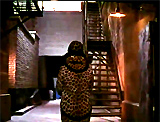 At NYC's New Amsterdam Theatre 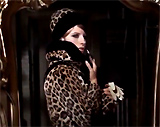 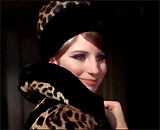 Fanny In Front of a Mirror: ("Hello, gorgeous") |
||||||||||
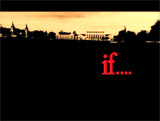
|
If... (1968, UK)
In the opening sequence of director Lindsay Anderson's violent and controversial coming-of-age social drama about youth rebellion at a conformist public school in the UK, students were returning to school for another repressive year. Returning senior student Mick Travis (Malcolm McDowell in his debut film role), a rebellious and anti-authoritarian character, was called Guy Fawkes by one of the prefects ("It's Guy Fawkes back again") as he entered the boarding house. When he removed the black scarf on his face, he first trimmed his concealed mustache, and then spoke into the mirror:
He explained the reason for growing it: "To hide my sins." Soon after, Mick was shaving off the illegal growth of hair. |
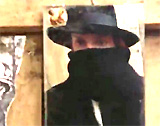 
|
||||||||||
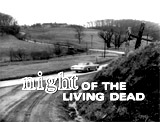
|
Night of the Living Dead (1968)
In this horror film's opening, Johnny (Russell Streiner) had just taken his slightly neurotic and edgy sister Barbra (Judith O'Dea) to visit their father's grave in a remote western Pennsylvania cemetery, a three-hour drive in their two-door Pontiac from Pittsburgh. When Barbra nervously continued to admit a phobia of cemeteries and the dead, and they placed flowers on the grave, Johnny recalled their childhood play when he scared Barbra in the same location when they were younger:
Johnny joked and teased Barbra using a creepy Boris Karloff-like (or Vincent Price) voice:
Barbra took the prank seriously (she angrily reprimanded him: "You're acting like a child!") - when suddenly a staggering, stumbling, pale-faced figure (S. William Heinzman), looking like a drunk vagrant in a disheveled suit, approached and then actually attacked Barbra - when Johnny came to her defense, he was killed as they struggled and he fell and his head struck a tombstone, while Barbra watched in horror. Barbra fled to the car with the reanimated, slow-moving living corpse shambling after her. |
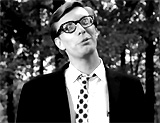 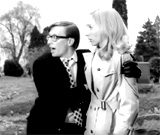 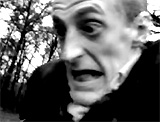 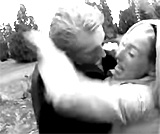 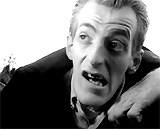
|
||||||||||
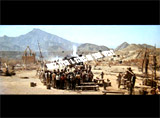
|
Once Upon a Time in the West (1968, It./US) (aka C'era una Volta il West)
This epic Italian western from Sergio Leone had one of the most memorable opening sequences of all time. At an isolated and deserted Cattle Corner train station (with ambient sounds of a dry dusty wind, a creaking rocking chair, door and windmill, the cracking of knuckles, a dripping water leak from a tower, a noisy telegraph machine, and a pesky buzzing fly), three unnamed gunman appeared in the detailed, almost wordless, widescreen opening sequence:
The trio were sent by cold-blooded killer Frank (Henry Fonda) to await the late arrival of a train. Finally, a mysterious stoic man with no name playing a harmonica (Charles Bronson) was let off the late-arriving train. "Harmonica asked: "Did you bring a horse for me?" Snaky casually mentioned that they only had three horses: "Well, looks like we're, looks like we're shy one horse." Harmonica shook his head in disagreement: "You brought two too many." After a brief shootout, all three gunmen were killed by Harmonica. |
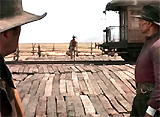 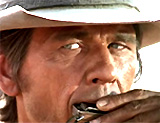 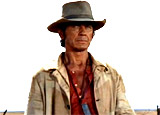 
|
||||||||||
 |
Once Upon a Time in the West (1968, It./US) (aka C'era una Volta il West)
An unidentified posse of five men wearing dirty yellow duster topcoats casually slaughtered and massacred (in cold-blood) landowner Brett McBain (Frank Wolff) and his entire family of three children at their remote "Sweetwater" farm. The killers had been hired by crippled railroad baron Morton (Gabriele Ferzetti) to eliminate the property owner in order to acquire his prime land (and water source) for the railroad. It was on the day of a welcoming feast for Irish landowner McBain's newly-arrived bride Jill McBain (Claudia Cardinale) - a reformed prostitute from New Orleans. The first to die in the massacre were the patriarch and his elder son Patrick (Stefano Imparato) and teen daughter Maureen (Simonetta Santaniello) - all shot outside as they prepared a meal. At the sound of the deadly rampage, the innocent youngest, freckle-faced nine year-old son Timmy (Enzo Santaniello) ran out of the house. The darkly-silhouetted killers slowly converged on the sole survivor. Power-hungry, blue-eyed, and ruthless lead killer Frank (Henry Fonda in a cast-against-type role) made a grand entrance with an icy closeup (after a long build-up), as the camera circled around his left side and presented his profile. One of Frank's men (Michael Harvey) asked about the fate of the newly-orphaned child: "What are we gonna do with this one, Frank?" In response, Frank's faint smile disappeared, and he spit out a brown gob of tobacco juice. He calmly stated: "Now that you've called me by name..." and pulled out his revolver at waist-level. Because his gunman happened to identify Frank "by name," Frank pulled his trigger and the red headed boy was also murdered. The image cut abruptly to the screeching sounds of a steam-powered train, a transition to the next scene |
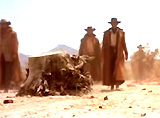 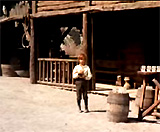 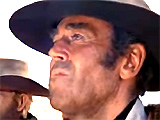 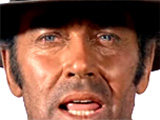 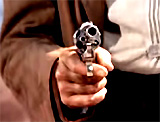 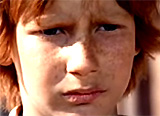
|
||||||||||
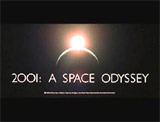
|
2001: A Space Odyssey (1968, UK)
Stanley Kubrick's landmark, science fiction classic was a profound, visionary and astounding film and a tremendous visual experience. The opening "Dawn of Man" segment was separated from the Lunar Journey segment - a jump-cut of four million years, by the associative image of the ape's tossed bone (tool/weapon) that instantly rotated and dissolved into a white, orbiting space satellite from Earth.
Different kinds of weapons satellites (rectangular and cylindrical) floated by, circling around the globe of Earth. A winged, arrow-shaped spaceship, the Pan American, dart-like space shuttle Orion soared from Earth through space toward the Moon, bound first for Space Station 5 - a wheel-shaped, international way-station or transfer point for passengers traveling on to the lunar surface.
Images of the giant circular space station revolving and orbiting in space were accompanied by the lyrical Blue Danube Waltz by Johann Strauss. The pace was deliberately slow, emphasizing the vast enormous vistas and the harmonious order of space. |
  Weapons Satellite (German?) 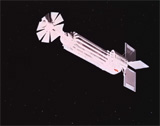 Cylindrical Weapons Satellite (Chinese?) 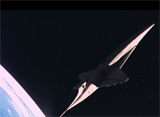 Pan-Am Space Shuttle Orion |
||||||||||
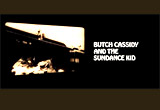
|
Butch Cassidy and the Sundance Kid (1969)
This comedy-western was likeably entertaining, charming and amusing - it told of the friendship and camaraderie shared between the two handsome and humorous buddy leads - legendary, turn-of-the-century Western outlaws Butch Cassidy (Paul Newman) and gunslinger The Sundance Kid (Robert Redford). In the memorable opening, the screen was filled with an immense close-up of the face of sly, funny, witty, smart-ass, egotistical, and handsome Butch Cassidy [not identified as Butch until later in the film]. He was casing the outside of a modern, high-security bank, for a future bank robbery, and realizing that it was too secure. Butch's partner was introduced in a similar, sepia-toned sequence filmed in close-up. During a blackjack card game in Macon's Saloon - the dead-panning, silent, dim-witted, mustached, dark-hatted cardsharp 'The Sundance Kid' [also not identified by name until later] was also in large close-up. When Sundance was accused of cheating by his final, sole opponent, he was offended (although ignoring the accusation) yet he kept playing, even when Butch joined him and attempted to interrupt an impending shoot-out. When the gunman realized the identity of his opponent - that he was up against quick-draw "Sundance," a horrified, dismayed look crossed his face. As they stood facing each other, the gunman humbly apologized to the fearsome killer with a deadly reputation. |
 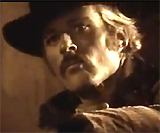
|
||||||||||
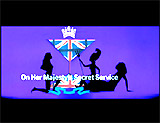
|
On Her Majesty's Secret Service (1969, UK)
In the first Bond film following the Sean Connery era (of five films from 1962-1967), George Lazenby had to make a striking appearance as the new James Bond. The pre-title credits sequence opened in Portugal, where the unseen Bond was driving along the coast in his 1969 Aston Martin DBS. He stopped to rescue an unidentified woman (fully clothed) from drowning herself in the surf. After carrying her back to the sand and reviving her, he introduced himself:
But then, after her rescue, two men assaulted Bond by gun and knife-point, and while he fought them off, she escaped. He was left holding the woman's shoes. He joked with the audience (breaking the "fourth wall") when he said to the camera:
|
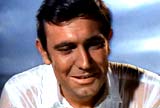 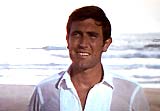
|
||||||||||
(chronological, by film title) Introduction | 1920s-1935 | 1936-1939 | 1940-1945 | 1946-1949 | 1950-1955 | 1956-1959 | 1960-1965 | 1966-1969 1970-1975 | 1976-1979 | 1980-1985 | 1986-1989 | 1990-1995 | 1996-1999 | 2000-2005 | 2006-Present |